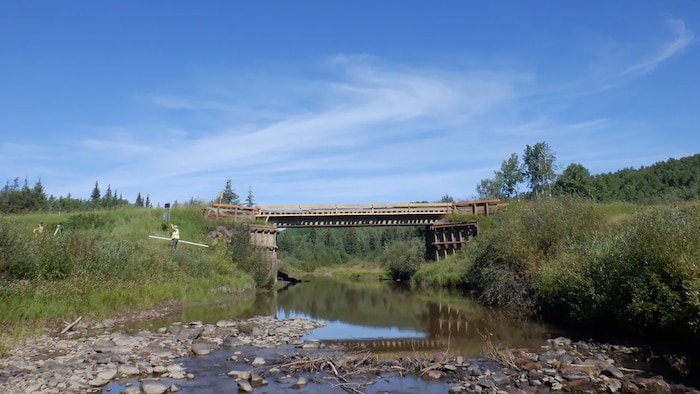Open in full screen mode The Blueberry River in northeastern British Columbia experienced very low water levels due to drought in 2022. Radio-Canada Speech synthesis, based on artificial intelligence, makes it possible to generate spoken text from written text. The B.C. Energy Regulator warns the oil and gas industry of a risk of water shortages in 2024 and advises them to prepare for restrictions on its use, or even suspensions. According to the Régie, the effects of the drought of summer and fall 2023 in the north of the province continue to reduce the flow of watercourses and groundwater since the level of snowfall is lower than the annual average, according to the latest provincial report on snow conditions, published February 1. The combination of these two phenomena increases the risk of drought in 2024. Water supplies could therefore be reduced in the north for another summer, says the advisory of the Régie of January 26 (New window). The northeast of the province, where the majority of oil production sites and of natural gas, was the region hardest hit by drought last year. The drought level of the four basins in this region, Fort Nelson, East Peace, North Peace and South Peace, is still today at 5, the lowest level higher (New window). Loading ELSEWHERE ON INFO: 2026 FIFA World Cup: Canada gets 13 matches in total Régie hydrologist Ryan Rolick explains that this notice was issued as a precaution as there may be more snow accumulation during the winter and there may also be sufficient rain in the spring and summer. However, the opposite is just as possible, he says: If snowfall is insufficient or spring and summer are similar to those of 2023, this could lead to another season of alarming water shortage, mainly in the northeast. The Canadian Association of Petroleum Producers says in a written statement that its members based in British Columbia are monitoring the situation closely . Companies are using recycled water from their own operations to reduce the amounts of fresh water used, writes Richard Wong, vice-president of the CPPA. According to the Authority, the amount of water that industry withdraws each year represents an average of 0.004% of the total volume of annual runoff in northeastern British Columbia. However, it confirms the suspension for an indefinite period of water extraction permits with regard to 10 rivers located in the watersheds of the Liard and Peace as well as that of the Fraser River. Companies should update their water management plan and find solutions ;storage for use during a drought, advises Ryan Rolick. With information from Karin Larsen< /p>
2026 FIFA World Cup: Canada gets 13 matches in total
Drought could limit water use by gas and oil companies in B.C.

